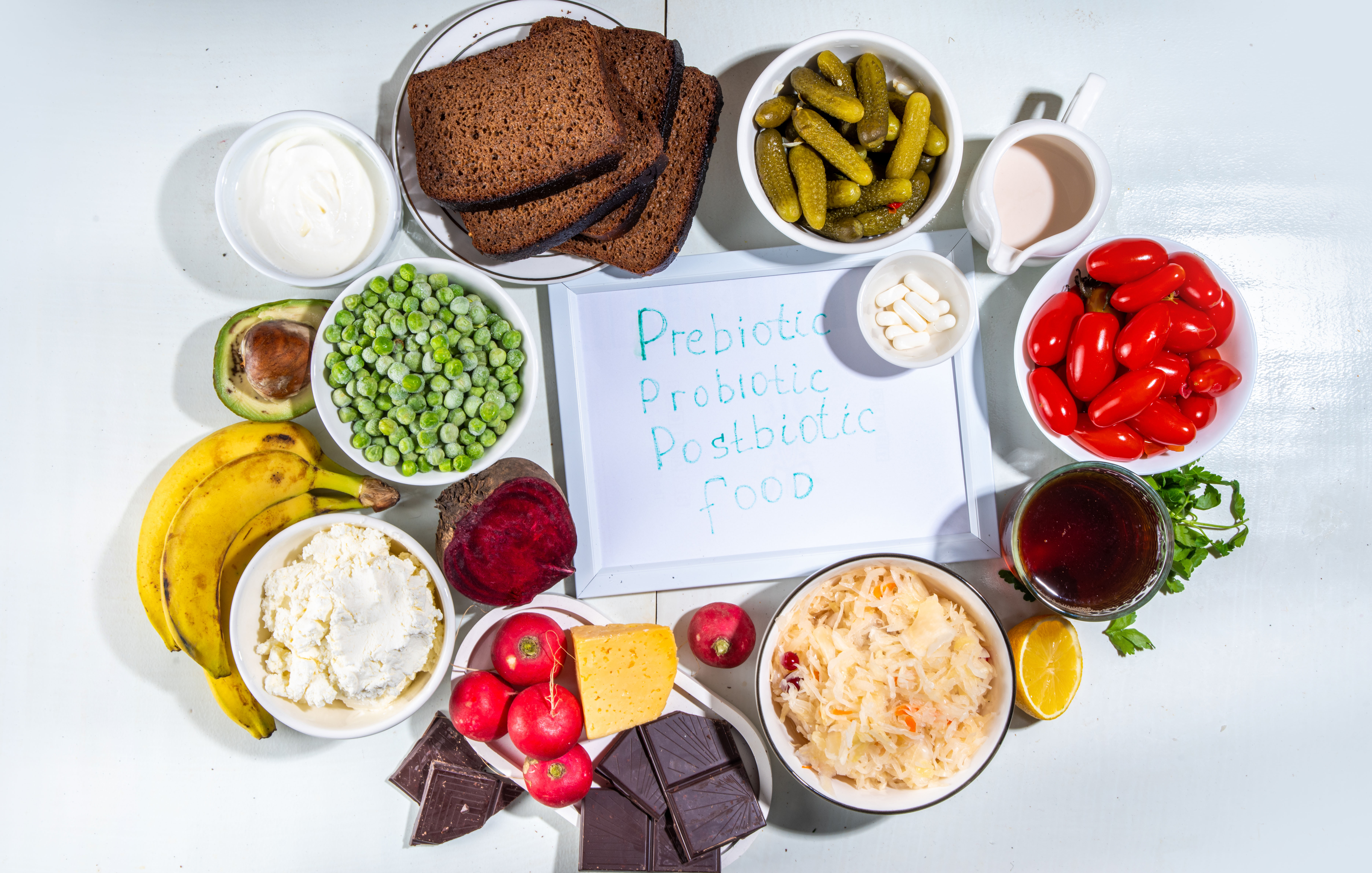Let’s talk about gut health! You might be thinking that this blog is going to provide tips on increasing fiber in your diet or cover the “all you need to know” about probiotics and pre-biotics, right? Well, turns out there is a new beneficial “supplement” that can improve gut health too and it’s called postbiotics.
Postbiotics are bioactive compounds generated during the fermentation process in our colon. Essentially, they are the remaining “compounds” the probiotic bacteria in our body produce after breaking down things like fiber. Postbiotics include metabolites, short-chain fatty acids, microbial cell fractions, functional proteins, and remaining constituents of polysaccharides (undigested parts of fiber). It is stipulated that these compounds can confer various health benefits to the human body.
As a Nutrition Specialist - or overall health enthusiast - definitely consider postbiotics as a strategy for healthier digestion!
What are some common Postbiotics?
• Exopolysaccharides (EPS) are extracellular carbohydrate polymers. In laymen's terms, it’s a large unit of a bunch of carbohydrates (or sugar) molecules. Reading the back of food labels, you might recognize some such as xanthin and cellulose. They can be commonly found in lactic acid bacteria and are used in the food industry for their water retention and swelling properties. Due to their swelling properties, they can act as a protective barrier and have been found to have antimicrobial and anti-inflammatory properties.
• Cellular wall fragments of probiotics are a complex assemblage of peptidoglycan, teichoic acids, polysaccharides, and proteins — all of which are considered important for the host. Several studies have shown that cell wall fragments extracted from Lactobacillus and Bifidobacterium might play a role in maintaining immune balance in the gut.
• Metabolites such as short-chain fatty acids and vitamins (vitamin K and biotin) seem to play a role in the gut-brain axis, not only modulating microbiome diversity but immune and nervous system responses as well.
It should be noted that first, the microbiome is vastly complex, and the composition of gut bacteria can greatly differ between individuals and populations. Secondly, research on postbiotics is still relatively new, and understanding the potential benefits can also greatly vary between individuals depending on their natural gut bacteria.
4 Health Benefits of Postbiotics (According to Latest Research)
- They Can Help Fight Inflammation
- Help Improve Immunity
- Postbiotics can alleviate digestive disorders
- They can potentially improve cardiovascular health
1. They can help fight inflammation
To date, there has been an established relationship between gut diversity and immune health. Individuals that suffer from common metabolic and digestive diseases/disorders such as obesity, type 2 diabetes, and IBD have less bacterial diversity and a reduction in several healthy gut bacteria. The use of postbiotics is believed to help increase the diversity and proliferation of the microbiome.
One of the most common postbiotics studied is short-chain fatty acids (SCFA’S). Short-chain fatty acids are a class of fatty acids with less than six carbons, and most of the production of these fatty acids occurs in the small intestine and colon; however, they can also be used as energy sources by other tissues. The three main short-chain fatty acids are butyrate, acetate, and propionate.
A few studies in mice with IBD have shown that SCFA’s inhibited inflammatory processes, in turn showing a protective role when harmful or foreign species were present.
2. They can help improve immunity
A proposed benefit of postbiotics is the influence they have on immune responses. One study in mice showed administration of heat-killed L. paracasei increased levels of IL-12, which plays a major role in T-cell production (cells that fight against disease and infection!).
Do you know what else helps boost immunity? Proper absorption of vitamins and minerals is responsible for fighting infection! One study showed that the use of postbiotics helped decrease local inflammation in gut sites which allowed for increased absorption of nutrients.
3. They can alleviate issues associated with digestive disorders
One proposed mechanism of postbiotics, namely the use of short-chain fatty acids, is that they can heal gut tissue and up-regulate the expression of tight junctions. One of the biggest issues when it comes to digestive disorders is that it all involves inflammation or damage to the cells lining our gut and intestines. Postbiotics can help digestive disorders by binding to the lining of the gut and inhibiting invasive pathogens from causing damage.
4. They can potentially improve cardiovascular health
Soluble products of probiotics (aka postbiotics) have been seen to reach deeper intestinal wall layers during the administration of live bacteria. Due to the observed protective effects of postbiotics, one study aimed to see if administration of “products” harvested from Lactobacillus rhamnosus cultures could protect smooth muscle cells from Lipopolysaccharide-induced myogenic damage (a fancy way of saying protecting against harmful toxic products that damage cardiovascular tissues). Their study showed that postbiotic administration recovered damaged tissues by more than 50%!
The use of postbiotics is increasingly becoming of interest because there is no need for handling live bacteria. Probiotics have a shelf-life, and after expiration, the live bacteria no longer confer any health benefits. Postbiotics can allow for more flexibility in storage, handling, transport, and administration. However, are there associated health risks with postbiotics?
While the current risk for an adverse reaction from postbiotic use is very low, there still isn’t enough research to determine if harmful toxins can be released from dead bacteria. So, while it’s unlikely that by-products, cell fragments, or metabolites can inflict any harm we cannot safely say there is ZERO risk.
Overall, seems like postbiotics propose compelling evidence to suggest they could be an alternative or adjunct to maintaining a healthy gut! They show promise of enhancing immunity, fighting inflammation, alleviating symptoms of digestive disorders, and even offering cardiovascular protection.
As of now, it seems the most common type of administration is via capsules and currently there is a low risk associated with postbiotic use. However, as with any new supplement, it’s important to dive into the literature on specific bacterial strands these postbiotics are derived from, as well as dosage and manufacturing practices to ensure a safe product! So, while all signs are suggesting postbiotics would be a great supplement to start taking, still proceed with caution and talk to your doctor before starting this new product.
Resources
https://jasbsci.biomedcentral.com/articles/10.1186/s40104-022-00688-1
https://www.frontiersin.org/articles/10.3389/fimmu.2019.02754/full
https://www.ncbi.nlm.nih.gov/pmc/articles/PMC6801921/

















